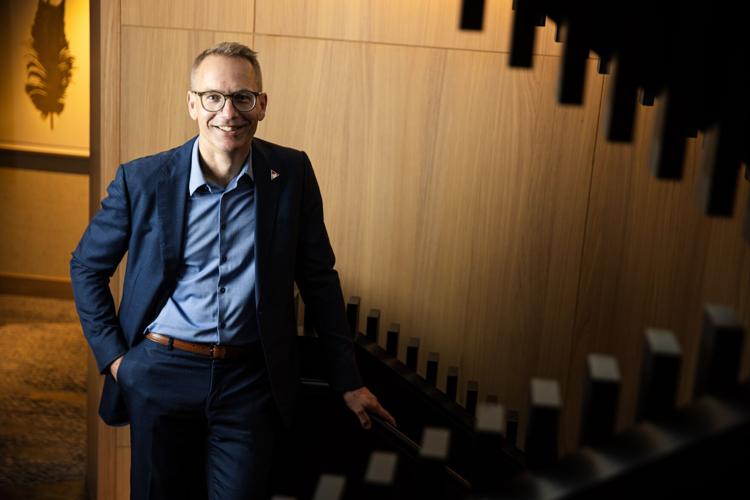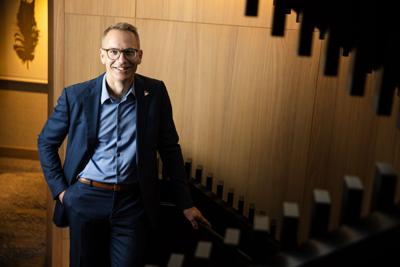For Darrell Schuurman, inclusivity isn‚Äôt just a matter of social justice ‚ÄĒ it‚Äôs an economic imperative.
According to by Nielsen on behalf Canada’s 2SLGBTQI+ Chamber of Commerce (CGLCC) the country is home to 100,000 queer owned businesses, which generate a combined $22 billion in economic activity, and employ roughly 435,000.
‚ÄúHaving inclusive workplaces, supporting queer businesses is not just good for our economy and growing our GDP, it‚Äôs critical,‚ÄĚ says the organization‚Äôs co-founder and CEO. ‚ÄúIf we want to innovate and have a strong, thriving economy, it needs to be inclusive.‚ÄĚ
That‚Äôs especially true today, as equity, diversity and inclusion (EDI) initiatives have come under attack in both the corporate and political arena ‚ÄĒ¬†not just across the border, but here at home.
‚ÄúWe know that with tariffs, small businesses ‚ÄĒ especially diverse small businesses ‚ÄĒ are disproportionately affected,‚ÄĚ Schuurman says. ‚ÄúThen you compound on what’s happening from an EDI lens and these executive orders that are directly targeting our queer and trans community, there‚Äôs a lot of fear right now, both economic and social.‚ÄĚ
Schuurman says he co-founded CGLCC in 2003 to make that economic case while also connecting members to resources, mentorship and networking opportunities.

Darrell Schuurman opens Canada’s 2SLGBTQI+ Chamber of Commerce summit at the Park Hyatt on Thursday. “I‚Äôd say we‚Äôre in unprecedented times,” Schuurman told the Star, “but it feels like every day is unprecedented nowadays.”
Nick Lachance/ļ£Ĺ«…Á«ÝĻŔÕÝStarThis week the non-profit brought together 350 2SLGBTQI+ entrepreneurs, allies and corporate and government partners for a two-day summit in ļ£Ĺ«…Á«ÝĻŔÕÝto strengthen those ties.¬†
Schuurman says like many LGBTQ+ Canadians he long feared that being his authentic self would come with negative social and economic consequences. It wasn’t until the small-town Alberta native left his home province that he felt comfortable coming out.
While working in the travel industry in Ottawa Schuurman identified an opportunity to use his background in workforce development to co-create a national organization to drive tourism in Canada among the queer community.
‚ÄúOne of the key elements they looked for when they chose destinations or businesses to frequent is safety,‚ÄĚ he says. ‚ÄúTwenty years ago, that fear over not just emotional safety, but physical safety was real.‚ÄĚ
While the country has come a long way, Schuurman says there is still work to be done.
The Star caught up with Schuurman from his home office in ļ£Ĺ«…Á«ÝĻŔÕÝto discuss the progress that‚Äôs been made, the pullback in support for EDI initiatives and pride events, and why Canada‚Äôs economic prosperity requires supporting workers and entrepreneurs of all stripes.
What inspired you to study business and go into the travel industry?
My parents were entrepreneurs in the logging industry, and I was an active part of their business growing up in Rocky Mountain House, Alberta. My summer job as a teenager was operating a bulldozer.
Entrepreneurship is in my blood, and so going to business school was a logical choice.
I did a Bachelor of Commerce at the University of Calgary, and I was very privileged to travel a lot with my parents as a kid, so I married those interests and did a concentration in tourism.
What inspired you to bring your personal life into your career?
Growing up in Alberta as a young gay man, I never felt comfortable coming out, and I didn’t until after I left. 
A few years after I graduated I moved to Ottawa to work at the Canadian Tourism Human Resource Council, which is focused on labour market development, and I moved with my partner at the time; they brought us there together. In fact, he was a student, and they brought him on as a part-time employee.
Beno√ģt Robert’s dream of an alternative to car ownership was born in the early ‘90s.
Keep in mind this was over 20 years ago, and there weren’t a lot of inclusive workplaces, but here was a company that knew I was gay, knew I had a partner, and was eager to support us.
Seeing the struggles that we face made me want to create a more inclusive space for queer people in the workforce, in business and in travel.
When did that opportunity arise?
Sometime around the year 2000 I went to a networking event hosted by the Ontario LGBT Chamber of Commerce, and I started floating the idea of a queer travel organization.
That’s where I met my co-founder, Bruce McDonald. He was thinking about starting a national chamber of commerce, and we started talking about how the two would work together well, because tourism is often part of chambers of commerce.
Around the same time, they had just launched the first National LGBT Chamber of Commerce in the United States to unify the dozens of different state and local affiliates across the country. In Canada we also had an LGBT Chamber of Commerce in B.C., Quebec, Manitoba and Ontario, but no national body.
What was the founding mission?
The mandate has always been around economically empowering 2SLGBTQI+ entrepreneurs, employees and the community at large by creating opportunities and access.
There are great organizations that are very focused on social or legal issues, but our job was to create a more inclusive economy and drive positive change through finance. It’s about going from ‘it‚Äôs the right thing to do’ to ‘it’s good for business.’
With 400 acres to work with, Northcrest Developments CEO Derek Goring is “excited about its
Part of that was helping Canadian tourism businesses create safe and inclusive spaces to help drive tourism receipts from the queer and trans community through our Rainbow Registered program.
We made sure these destinations had the training, knowledge and awareness to service the queer and trans community and then helped them promote it and reach that community, with the goal of driving economic impact in Canada.
Why was it necessary to have a formal program for the tourism sector?
There was and still is a lot ‚Äúpink washing,‚ÄĚ where companies will slap a rainbow flag on their window ‚ÄĒ¬†especially during Pride season ‚ÄĒ say that they’re inclusive, or that they’re welcoming, but are they really? Do they really understand how to truly serve the community and create that welcoming space?
A same sex couple checking into a hotel asking for one bed, for example, can be a real source of anxiety, and we wanted to remove that anxiety by delivering that training and certifying that this business is truly welcoming.
How do you support queer owned businesses?
We did a national research study, and we found some key systemic barriers that our queer businesses face as they’re growing or starting up.
One of those big pieces is access to mentorship, so we launched our ‚ÄúOut for Businesses‚ÄĚ mentorship program back in 2016 to address that barrier.
Another one was access to global markets. Queer and other diverse businesses are under-represented in global trade, so we launched a global trade program in 2017 to help our businesses navigate that process and access opportunities globally.
There’s also lots of research that shows diverse owned businesses are under-represented in corporate and public supply chain, and we help them access those contracts and procurement opportunities.
We have programs supporting mental health, supporting queer newcomers who want to start businesses, and to strengthening the ecosystem through organizations that support entrepreneurs.
Two years ago the federal government made a $25 million investment over three years to support 2SLGBTQI+ businesses. We’ve been stewards of that investment, working coast-to-coast-to-coast to empower queer entrepreneurs, help to develop their skills, to provide mentorship, and to create access to global procurement opportunities.
What does that fund say about Canada’s role in the global conversation?
This is the first investment of its kind in the world, and its impact is being watched globally. My hope is that you’re going to see more countries investing in not just queer businesses, but diverse businesses, because of the economic impact it has.
Twenty years ago, Canada put itself on the map by becoming the first major economy to legalize same sex marriage, and it is looked at as a global leader.
At the same time, it’s easy to point south of the border and say that’s where the problem is, but there’s been a lot happening here too around anti-queer, anti-trans legislation and rhetoric.
If we can help to eliminate some of those barriers and help these entrepreneurs thrive, to put their whole selves into their business, it helps create that broader economic impact for our community and our country.
What was the focus of this week’s summit?
I’d say we’re in unprecedented times, but it feels like every day is unprecedented nowadays.
We know that with tariffs, small businesses ‚ÄĒ especially diverse small businesses ‚ÄĒ are disproportionately affected. Then you compound on what’s happening from an EDI lens and these executive orders that are directly targeting our queer and trans community, there‚Äôs a lot of fear right now ‚ÄĒ both economic and social.
So, it’s more important than ever to bring our community and our allies together in solidarity to identify ways to overcome these challenges.
Are there less of those partners now, given the pullback in pride sponsorship?
There are always those companies that are there to say they were there, whether it’s to grow their customer base or to signal something.
With what we’ve seen over the last few months in the United States, those companies that were just being performative are retreating quickly, they’re eliminating their EDI programs, and that’s unfortunate, but it was never really ingrained in their culture anyway.
ZenaTech CEO Shaun Passley says drone technology is ‘something more sci-fi’ these days being
There’s also a lot of companies operating in the United States that need to abide by these executive orders banning EDI programs, but they’re doing everything they can to follow the rules while remaining committed, because it’s something they truly believe in.
The economic uncertainty has also constrained budgets across the board, and companies are pulling back on all sponsorship activities. The corporate partners that we work with, however, are working to find other ways to engage, despite those financial limitations.



































To join the conversation set a first and last name in your user profile.
Sign in or register for free to join the Conversation